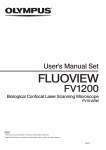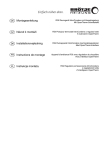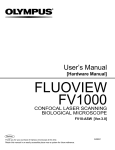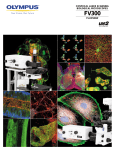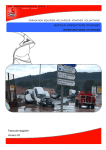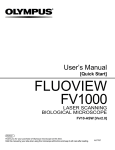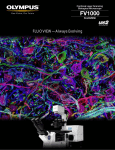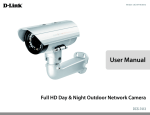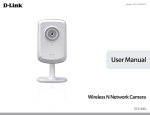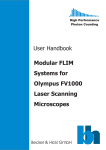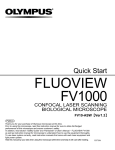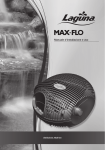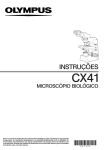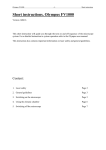Download Fluoview FV1000 safety guide
Transcript
User’s Manual [Safety Guide] FLUOVIEW FV1000 CONFOCAL LASER SCANNING BIOLOGICAL MICROSCOPE FV10-ASW [Ver2.0] Notice Thank you for your purchase of Olympus microscope at this time. Retain this manual in an easily accessible place near a system for future reference. AX7807 CAUTION CAUTION FV1000 is a CLASS 3B laser product. The procedures for using this system are classified as follows: z Service “Service” means any adjustment or repair performed by highly trained and skilled technical personnels who are provided the service training following to the service manual for this system. The performance has influence on the feature of this system, and there is a risk which unintended CLASS 3B laser light is emitted. z Maintenance “Maintenance” means adjustment or other procedures performed by customers to maintain that this system functions properly. z Operation “Operation” means all performance described in the user’s manuals in this system. CLASS 3B laser light is only emitted from the objective lens during the actual execution. The User’s Manuals of this system consist of the following: In order to maintain the full performance of this system and ensure your safety, be sure to read these user’s manuals and the operating instructions for the laser unit and light source unit before use. z FV1000MPE / FV1000 User’s Manual [Laser Safety Guide] z FV1000 User’s Manual [Safety Guide] z FV1000 User’s Manual [Hardware Manual] z FV1000 FV10-ASW User’s Manual [Quick Start] Also, we have prepared one service manual for this system as below. Technical personnels who perform the service require to take the service training. z FV1000MPE / FV1000 Service Manual Reproduction, copying or duplication of a part or all of this software and manual is prohibited. Page 1 Registered Trademarks Registered Trademarks Microsoft, Microsoft Windows, Excel for Windows are registered trademarks of Microsoft Corporation. Other brand names and product names are trademarks or registered trademarks of their respective owners. FLUOVIEW MANUAL CONFIGURATION The FLUOVIEW system uses two manuals including this “User’s Manual” and the on-screen manual built into the software (“Online Help”). The User’s Manual is composed of the two following volumes and subject matter: SAFETY GUIDE Describes notes and cautions on using the FLUOVIEW system and on types of warning labels. 1 SAFETY CAUTION ............................................................................... 1-1 2 WARNING LABELS............................................................................................ 2-1 3 CAUTION FOR SYSTEM OPERATION............................................................. 3-1 SPECIFICATIONS Describes the specifications of the FLUOVIEW system. 1 SPECIFICATIONS.............................................................................................. 1-1 NOTATIONS IN THIS MANUAL This manual complies with the following notations. Notation of Caution, Notes and Tips Notation Description Caution to prevent injuries to the user or damage to the product (including surrounding objects). NOTE TIP 2 Page Indicates details of caution to prevent damage or deterioration of products. Hint or one-point advice for user reference. SAFETY GUIDE On This Volume This volume describes caution and notes for safe use of the FLUOVIEW FV1000 system. Be sure to read this volume completely before use. If the system is operated in a manner not specified by this manual, the safety of the user may be impaired. IN addition, the system may also be damaged. Always operate the system as outlined in this user’s manual. CONTENTS 1 SAFETY CAUTION 1-1 2 WARNING LABELS 2-1 2-1 Laser Safety Warning Labels..........................................................2-1 2-1-1 Warning Label ............................................................................................... 2-1 2-1-2 Aperture Label............................................................................................... 2-2 2-1-3 Protective Housing Labels............................................................................. 2-5 2-2 Other Warning Labels ...................................................................2-16 3 CAUTION FOR SYSTEM OPERATION 3-1 3-1 Transportation of Equipment .........................................................3-1 3-2 Treatment of System .......................................................................3-1 3-3 Handling Precautions......................................................................3-1 3-4 Recommendations for Use .............................................................3-3 3-5 Care and Storage .............................................................................3-4 3-6 Caution .............................................................................................3-4 3-7 Computer and Software ..................................................................3-5 SAFETY CAUTION 1 SAFETY CAUTION This product has been specified as a laser product of one of the following classes according to the combined laser. (1)Visible-light laser combination CLASS (1) b (CDRH) CLASS 3B IEC60825-1:1993+A1:1997+A2:2001 Laser products of Class 3B are products that can only be used under control of laser safety officer. Assign a laser safety officer and ensure safety in accordance with the instruction given by the said laser safety officer. In "IEC 60825-1, Safety of laser products – Part 1: Equipment classification, requirements and user’s guide", it requires safety preventive measures for users of laser products. Before using, read IEC 60825-1 of the latest edition carefully and then, use the products after enforcing adequate measures. Unless the safety measures indicated in IEC 60825-1 are provided, our company cannot insure safety of the product since it may cause exposure of dangerous laser emission. SAFETY GUIDE Page 1-1 SAFETY CAUTION Safety Notes Take care regarding the following points during operation. When the displayed function window ([Acquire] panel) shows the following figure, the laser beam is being output from the objective mount hole. There is potential danger that the reflected light may enter your eyes or the scattered light may leak outside etc. Take special care for operating. Never look at the specimen while the laser scanning. Shows “the laser beam being output”. Shows “the laser beam being output”. Shows “the laser beam being output”. SAFETY GUIDE 1-2 Page SAFETY CAUTION In case of [Manual] mode “Laser beam being output” appears. In case of [Trigger Input] or [Key Assign] mode “Laser beam being output or Laser emission being waited” appears. NOTE When [Trigger Input] mode is used and, even if <Laser emission> button is set to the state of “Laser beam being output”, the system would remains in the state of “Laser emission being waited” when the trigger is not active. Therefore, the laser is not emitted. When the laser emission should be terminated with [Trigger Input] mode, click <Laser emission > button and set the system to the state of laser stop. NOTE When [Key Assign] mode is used and, even if <Laser emission> button is set to the state of “Laser beam being output”, the system would remain in the state of “Laser emission being waited” when the key is not pressed. Therefore, the laser is not emitted. When the laser emission should be terminated with [Key Assign] mode, click <Laser emission> button and set the system to the state of laser stop. SAFETY GUIDE Page 1-3 SAFETY CAUTION While the LED lamp on the FV10-SU is illuminated, the laser beam is being output from the objective mount hole. There is potential danger that the reflected light may enter your eyes or the scattered light may leak outside etc. Take special care for operating.Never look at the specimen while the laser scanning. It indicates that laser is being emitted when two lamps are lit. Two lamps FV10-SU ( with FV10-SUIX ) FV10-SU ( with FV10-SUBX) If any one of the LED lamps is illuminated solely while activating the FLUOVIEW software, there may be a system failure. Stop operating and contact your local Olympus representative. SAFETY GUIDE 1-4 Page SAFETY CAUTION • Do not expose your hand or finger to the laser beam output from the objective mount hole, objective tip or condenser lens, or your skin may be damaged. Also, never attempt to output the laser beam outside the system by inserting a mirror or a similar object in the light path. Otherwise, the laser beam may enter your eyes, which is extremely hazardous. • If the device is breaking down, the laser beam may illuminate under the objective. Do not put your hand in under the objective. When you place a specimen on the stage, you should pull out the stage, place a specimen on it and move the specimen toward under the objective with the stage movement knob. To take the specimen off, you should also pull out the stage with the stage movement knob. • Place the specimen horizontally on the stage. If the specimen inclines, the laser beam may reflect around the microscope, which is extremely hazardous. • Do not incline the specimen under the objective. Otherwise, the laser beam may reflect, which is extremely hazardous. • Do not remove the cube turret or the revolving nosepiece for objectives while the software is running. • Do not set or remove the specimen while the laser beam is output (during laser scanning). Otherwise, the reflected light from the specimen may enter your eyes, which is extremely hazardous. • Never attempt to remove any of the units while the laser beam is output (during laser scanning), the laser beam may be output from the system and cause an extremely hazardous situation. If you want to remove each unit, refer to our service representatives since it is defined as the service activities. (1) Transmitted lamp housing (ex.U-LH100) (2) Transmitted light fiber cable (Removal from Transmitted Detector Unit) (3) Cube turret of the reflected light fluorescence unit (4) Revolving nosepiece (5) Objective (6) Condenser (7) Differential interference slider (8) Excitation filter, spectral filter and barrier filter (Inside the scan unit) For detailed operation of lamp replacement, see the manual of the “REFLECTED LIGHT FLUORESCENCE ATTACHMENT“. SAFETY GUIDE Page 1-5 SAFETY CAUTION • When you do not attach a objective to a the revolving nosepiece for objectives, please be sure to attach a cap. • Do not touch the stage while the Z motor is applied. Otherwise, the stage may move and pinch your hand or finger, which is hazardous. • If the system is disassembled (for example, opening a cover with a tool), the ability of the product and safety cannot be assured. Never attempt to disassemble the equipment . • Do not bend or pull the laser fiber cable with an excessive force or step on it. If the laser fiber cable is damaged, the laser light may leak outside it and cause an extremely hazardous situation. Should such an event occurs, immediately turn off the laser power and contact your local Olympus representative. • The air outlet of the laser cooling fan blows out warm air. Do not place a flammable or non-heat-resistant object near the heat from the air outlet. • Connect the ground correctly. Otherwise, Olympus can no longer warrant the electrical safety and performance of the equipment. • Observe Electric Safety Standard of your country for power cable. If the proper cord is not used, product safety and performance cannot be guaranteed. • Do not plug or unplug a cord or cable while the power is supplied. Make sure that the main switch is set to “O” (OFF) before plugging or unplugging a cord or cable. • The power cord may be melt by the heat of hot parts (at 60°C or more), such as the lamp housing, etc, if the cord comes in contact with them. There is potential danger of electric shock. Distribute the power cord at an enough distance from hot parts. • The absolute alcohol used to clean the optics is highly flammable. Take special care in handling against fire, main switch ON/OFF, etc. Room ventilate is recommended while you use absolute alcohol. SAFETY GUIDE 1-6 Page SAFETY CAUTION • The power supply connector to the HeNe laser is clamped with special hardware, which should never be removed in order to unplug the connector. Even after the laser power switch is set to OFF, prevent electric shock by not touching the connector, because the laser head may still be charged. • The outer remote interlock connector is equipped for all lasers. (Current Rating:70mA, Voltage Rating: DC 24V) To prevent electric shock or fire, be sure to consult your local Olympus representative before handling the outer remote interlock connector. Remote interlock connector of laser PSU Backside Panel • The laser tube used with this system should always be disposed of in accordance with your local industrial waste treatment regulations. When disposal is required, please consult your local Olympus representative. • Also refer to the section described about safety of the manual of microscope. • Usage note of the external PMT unit (OPD/BXD/IXD) When image acquisition is not executed, uncheck the [Ch] check box of the [Ch] group box on the [Image Acquisition Control] window. [Ch] check box If the check box is left checked under the circumstance it is light in the room, it may damage PMT. SAFETY GUIDE Page 1-7 SAFETY CAUTION Safety Symbols The following symbols are found on the system. Study the meaning of the symbols, and always use the system in the safest possible manner. Symbol Explanation Indicates that the surface becomes hot, and should not be touched with bare hands. Otherwise burns may result. Before use, carefully read the user’s manual. Improper handling could result in injury to the user and/or damage to the equipment. Indicates that the voltage is so high. Take special care to prevent electric shock. Indicates that the laser beam is applied. Take special care in handling. Indicates that the main switch is ON. Indicates that the main switch is OFF. SAFETY GUIDE 1-8 Page WARNING LABELS/Laser Safety Warning Labels 2 WARNING LABELS 2-1 Laser Safety Warning Labels The kind of Labels attached on the laser system depends on the laser combination you have. Only visible laser system(s): label (1), (2), (3) 2-1-1 Warning Label (1) Attaching Position • Combination with IX81 Label (1) as shown The right-hand-side of a Scan Unit. SAFETY GUIDE Page 2-1 WARNING LABELS/Laser Safety Warning Labels 2-1-2 Aperture Label (2) Laser emits from the place with the above labels and indicated with arrow. • Combination with BX61 (2) Objective or revolving nosepiece hole. • Combination with BX61, BX61WI (2) Condenser lens. SAFETY GUIDE 2-2 Page WARNING LABELS/Laser Safety Warning Labels • Combination with BX61WI (2) (2) SAFETY GUIDE Page 2-3 WARNING LABELS/Laser Safety Warning Labels • Combination with IX81 (2) (2) Objective lens. Filter holder. (2) Condenser lens. SAFETY GUIDE 2-4 Page WARNING LABELS/Laser Safety Warning Labels 2-1-3 Protective Housing Labels (3) • Combination with BX61, BX61WI (3) (3) When the transmitted light unit is not installed (3) SAFETY GUIDE Page 2-5 WARNING LABELS/Laser Safety Warning Labels • Combination with BX61, BX61WI (3) • Combination with BX61, BX61WI (3) SAFETY GUIDE 2-6 Page WARNING LABELS/Laser Safety Warning Labels • Combination with IX81 (3) • Combination with IX81 (3) SAFETY GUIDE Page 2-7 WARNING LABELS/Laser Safety Warning Labels • Combination with IX81 (3) • Combination with BX61, BX61WI, and IX81 (3) SAFETY GUIDE 2-8 Page WARNING LABELS/Laser Safety Warning Labels • Common for combinations with BX61, BX61WI, and IX81 (3) • Common for combinations with BX61, BX61WI, and IX81 (3) SAFETY GUIDE Page 2-9 WARNING LABELS/Laser Safety Warning Labels • Common for combinations with BX61, BX61WI, and IX81 (3) • Common for combinations with BX61, BX61WI, and IX81 (3) SAFETY GUIDE 2-10 Page WARNING LABELS/Laser Safety Warning Labels • Common for combinations with BX61, BX61WI, and IX81 (3) • Common for combinations with BX61, BX61WI, and IX81 (3) SAFETY GUIDE Page 2-11 WARNING LABELS/Laser Safety Warning Labels • Common for combinations with BX61, BX61WI, and IX81 (3) SAFETY GUIDE 2-12 Page WARNING LABELS/Laser Safety Warning Labels • Common for combinations with BX61, BX61WI, and IX81 (3) • Common for combinations with BX61, BX61WI, and IX81 (3) SAFETY GUIDE Page 2-13 WARNING LABELS/Laser Safety Warning Labels • Combination with IX (EVA) (3) SAFETY GUIDE 2-14 Page WARNING LABELS/Laser Safety Warning Labels (4) • Combination with BX61, BX61WI (4) • Combination with IX81 (4) SAFETY GUIDE Page 2-15 WARNING LABELS/Other Warning Labels 2-2 Other Warning Labels (5) • Common for combinations with BX61, BX61WI, and IX81 (5) SAFETY GUIDE 2-16 Page WARNING LABELS/Other Warning Labels (6) • Common for combinations with BX61, BX61WI, and IX81 (6) Other protective cabinet labels than those shown above are attached to other positions on the product. These labels are for Olympus service personnel to refer to. For replacement of soiled or peeling warning labels, please contact your Olympus representative. SAFETY GUIDE Page 2-17 CAUTION FOR SYSTEM OPERATION/Transportation of Equipment 3 CAUTION FOR SYSTEM OPERATION 3-1 Transportation of Equipment z This system has been assembled and set up by specialist engineers and technicians. Avoid moving the system whenever possible, because this could alter the alignment of the optics. Please consult your local Olympus representative if you want to move or displace the system. If the system is moved by the user, Olympus cannot be liable, even if system trouble or damage occurs. 3-2 Treatment of System z The laser tube used with this system should always be disposed of in accordance with local industrial waste treatment regulations. When disposal is required, please consult your local Olympus representative. z The mercury burner used with the illumination device of this system should always be disposed of in accordance with local industrial waste treatment regulations. When disposal is required, please consult your local Olympus representative. 3-3 Handling Precautions z This system is comprised of precision equipment. Handle it with care. Don’t subject it to shock. z Do not bend or pull the laser fiber cable with excess force or step on it, for this may lead to considerable deterioration of performance. z Once the reflected light power is switched OFF, do not switch it ON again for at least 10 minutes. Otherwise, the life of the mercury burner may be shortened. z Do not expose the laser head to cool air from an air conditioner, etc. Otherwise, the operation will be unstable. z Absolutely avoid condensation of dew of the laser tube, for this will lead to explosion of the tube. When the laser tube has been located in a cold environment for a long period, do not heat the room until the laser operation has started to prevent condensation. z Any laser should be subjected for 8 hours of continuous aging every month when it has been left unused for a month or more. If aging is not performed, troubles which may affect the laser service life may occur, such as instability or stoppage of laser oscillation. SAFETY GUIDE Page 3-1 CAUTION FOR SYSTEM OPERATION/Handling Precautions z The air outlet of the laser cooling fan blows out warm air. Do not place a flammable or weak object near the heat from the air outlet. Also, to allow smooth heat radiation, provide clearance of at least 50 cm around the air outlet. (Otherwise, overheating of the laser tube may destabilize or stop the laser oscillation. The rise in the equipment’s internal temperature may also cause malfunction or failure.) z The laser power supply unit incorporates a cooling fan on the front and rear. To avoid blocking the area surrounding the cooling fan or the slits at the top and sides of the power supply unit, install the unit at a distance at least 30 cm from the surrounding walls. Also do not place objects such as papers or books on the laser power supply unit, for this may lead to overheating of the laser power supply unit or activation of the protection circuitry, causing stoppage of the laser oscillation. z The Power Supply Unit, Laser Combiner and computer have a cooling fan on the rear. To prevent malfunction, be sure to reserve a clearance of at least 10 cm around their air outlets. z Regarding Z direction move, besides mechanical limitation of microscope, a limit can separately be programmed in software within mechanical limitation. If a software limit is set to the position where objective lens or specimen comes close each other, for example, the damage of specimen that occurs by a contact with objective lens may be prevented. Bring [Microscope Configuration] window and enter value in [Near Limit] text box on [Focus] tab in [Microscope Configuration] dialog box. See Online Help – [Setting and Control of Microscope Main Unit] – [Setting Microscope Main Unit] – [About Focus tab]. z To prepare for an unexpected happening, power switch (cord) should be turned off (disconnect) easily. The system should be in a situation to be turned off(disconnect) the power switch(the power cord from inlet or wall outlet) easily anytime. z If you want to use the simple anti-vibration table, select the one which is endurable the weight, 70kg of the equipment. SAFETY GUIDE 3-2 Page CAUTION FOR SYSTEM OPERATION/Recommendations for Use z The proper conditions to operate lasers, Multiline Ar laser, HeNe laser, and Semiconductor Laser, are at a room temperature of 18 to 28 degrees C and at humidity of 30 to 80 %. To extend the service life of this system, avoid using it in the following environments. • In a place with excessive dust or dirt Dust and dirt taken in the oscillator may lead to failure. Clean the system and peripherals periodically to avoid ball of dust. • In a place where the temperature is low or high, or where the humidity is high This includes, for example, a place that is near a water tap, hot-water heater, room humidifier, heater, stove and a place subject to water drops. • In a place where humidity changes suddenly When a cold room is heated quickly, moisture may condense on the equipment and could irreparably damage the optics. z • In a place subject to direct sunlight • Outdoors • In a place where a flammable gas is produced • In a place with excessive vibrations • On an unstable surface of floor or platform Please carry out about exchange of consumable materials according to the handling description of each unit. 3-4 Recommendations for Use z Combination with either an upright microscope or an inverted microscope use ordinary biological objectives. Therefore, the observed specimen should be prepared using a cover glass with thickness of 0.17 mm or a petri dish with bottom thickness of 0.17 mm. The use of a special cover glass is recommended for observations using immersion objective for LSM. z When using this system, we recommend turning the indoor lighting low in order to reduce external disturbance light on observations. (The indoor lighting particularly affects the differential interference observation images.) SAFETY GUIDE Page 3-3 CAUTION FOR SYSTEM OPERATION/Care and Storage z To extend the life of laser head while it is not used for a long period, it is recommended to perform 8 hours of continuous aging at least once every month. Due to the properties of gas laser, the laser life becomes shorter when it is not used for a long period than when it is used continuously. z To stabilize the laser beam output, leave the system for warm-up after turning the laser power ON, then use it. All lasers should be warmed up for more than 30 minutes before use. 3-5 Care and Storage z When the microscope is not in use, be sure to set the main switch to “O” (OFF). After checking that the lamp housing has been cooled down, place the dust-prevention cover on the microscope for storage. z Never leave stains or fingerprints on the lenses and filters. Should a glass component be stained, simply blow dirty away using a commercially available blower and wipe gently using a piece of cleaning paper (or clean gauze). If a lens is stained with fingerprints or oil smudges, wipe it gauze slightly moistened with commercially available absolute alcohol. Since the absolute alcohol is highly flammable, it must be handled carefully. Be sure to keep it away from open flames or potential sources of electrical sparks – for example, electrical equipment that is being switched on or off. Also remember to always use it only in a well-ventilated room. z To clean a part, wipe with a soft cloth moistened with a little drop of diluted neutral detergent. Do not use organic solvents that will deteriorate the surface coating and plastic parts. 3-6 Caution If the equipment is used in a manner not specified in this manual, the safety of the user may be imperiled. In addition, the equipment may also be damaged. Always operate the equipment following this user’s manual. SAFETY GUIDE 3-4 Page CAUTION FOR SYSTEM OPERATION/Computer and Software 3-7 Computer and Software The computer data may be destroyed by accident. Be sure to back up the computer data as required. z Olympus cannot assume liabilities for any auxiliary damage, including compensation for loss of computer data, resulting from use of or inability to use this product. z The computer used with this system has already been set up with Microsoft Windows. This operating system should be backed up and the backup retained carefully by the user. (Olympus does not provide backup support.) For details on the computer and Microsoft Windows, also refer to the manuals provided with them. z Quality assurance for this system is provided at ex-factory basis. Be advised that any operating failure or disordered function due to Environment Setting Change (BIOS change) or installation of other software by user is not covered by the warranty. z When the remaining available hard disk space becomes small, the data processing rate may drop drastically or errors may tend to occur. To prevent this, delete unnecessary data files frequently. For the data file deletion procedure, refer to the manuals provided with Microsoft Windows. Free space of hard disk should be at least of 300Mbyte. z Disable the screen saver (by setting it to None) before use. With this software, the screen saver has already been set to “None” at the factory. z Never delete the folder or modify its name, which created in the hard disk of the computer in advance, or the software would not be starting up. z Never activate other softwares while this software is running, or it might cause malfunction of this software. SAFETY GUIDE Page 3-5 SPECIFICATIONS On This Volume This volume describes the specifications of the FLUOVIEW FV1000 system. Please read this volume so that you can understand the system before use. CONTENTS 1 SPECIFICATIONS 1-1 1-1 Specifications of Units ....................................................................1-1 1-2 Power Consumption........................................................................1-8 SPECIFICATIONS/Specifications of Units 1 SPECIFICATIONS 1-1 Specifications of Units Unit Laser Combiner FV10-MCOMB/S-2 Single port type Optical fiber cable FV10-MCOMB/D-2 Dual port type Dimensions (mm) Weight Gas laser MAX:40kg Intensity adjustment AOTF Operation continuous change 0.1 to 100%, 0.1%step Operating Mode Normal : Laser shut-off during beam flying back ROI : Intensity can be defined for each region Laser line can be selected for each region 22mW output, linear polarization forced air-cooled Ar ion laser (457.9nm, 488nm, 514.5nm) Power consumption: 90∼264V, 14A(max.) Multiline Ar laser FV5-LAMAR-2 Multiline Ar laser FV5-LAMAR HeNe (G) laser FV10LAHEG230-2 HeNe (G) laser FV10LAHEG230 Semiconductor Laser Specifications Polarized preserved fiber cable (length 3 m) (FV10-FURBB) FV10-MCOMB/S-2: 1 cable, FV10-MCOMB/D-2: 2 cables 514~640(W) x 364~504(D) x 236(H) LD405 LD440 LD473 LD559 40mW output, linear polarization forced air-cooled Ar ion laser (458nm, 488nm, 515nm) Power consumption: 100∼240V, 20A(max.) 1 mW output, linear polarization natural air-cooled Green HeNe laser (543.5 nm) Power consumption: 90∼132V, 0.65A(max.) 180∼264V, 0.65A(max.) 1 mW output, linear polarization natural air-cooled Green HeNe laser (543 nm) Power consumption: 115V, 0.4A(max.) 230V, 0.2A(max.) Head output 25mW, liner polarization With temperature control circuit using Peltier device Head output 25mW, liner polarization With temperature control circuit using Peltier device Head output 15mW, liner polarization With temperature control circuit using Peltier device Head output 15mW or more, liner polarization With temperature control circuit using Peltier device Power consumption: AC100∼120 / 220∼240V 0.3A(max) / 0.15A(max) 50/60Hz LD635 Head output 20mW, liner polarization With temperature control circuit using Peltier device SPECIFICATIONS Page 1-1 SPECIFICATIONS/Specifications of Units Unit Specifications Scan unit FV10-SU Basic Construction Microscope Adapter FV10-SUBX FV10-SUIX FV10-SUWI Scanning Device Scanning mode XY scanning Sub mode: ZoomIN, Clip Multi-dimensions : T, Z, Ramda Free factor combination Line Scan Point Scan Field of view (FN) Zoom factor Optical Path Switching Filter Cube Turret Dimensions (mm) Weight FV10-SU SPECIFICATIONS 1-2 Page The Scan Unit (FV10- SU) is adapted to the back of microscope using Microscope adapter (FV10-SUBX, FV10-SUIX, FV10-SUWI) . Prepared 3 ports for laser introduction (Visible, UV (option), IR(more than 700nm)) Detector Choice for SU : 3CH HQ ion-coating Filter Type 2CH Spectrometer + 1CH Filter Type Optional SU port available for twin scanner or 2CH non-confocal detector Point optical scanning system with 2 galvano-meter mirrors Pixels : 64*64 ~ 4096*4096 Aspect ratio : 1:1, 4:3, or Arbitrary ratio Scanning Speed (Pixel duration) : 2us ~ 5ms , 9 steps Dimension : Time, Z, Ramda (combine freely) Line Type : Straight line (incl. Rotation), Free line Number of lines : 1 – 32500 Lines 18 1- 50 X, 0.5x step Motorized Path Switching : LSM / FL Reflected Light Illuminator / External Optional Port Mount conventional cubes on 4 positions out of 6 on the turret. One position is dedicated to the LSM path. IX81 : Motorized 6 position BX61 : Motorized 6 position BX61WI : Manual 6 position 324(W) x 487.5(D) x 110(H) (FV10-SUIX) 324 (W) x 603.7(D) x 110(H) (FV10-SUBX) 324 (W) x 603.7 (D) x 110(H) (FV10-SUWI) 10.98kg (with FV10-SUIX) 12.90kg (with FV10-SUBX) 11.18kg (with FV10-SUWI) SPECIFICATIONS/Specifications of Units Unit Specifications Fluorescence Detector Unit Filter type fluorescent Detector FV10-FD Spectral fluorescent detector FV10-SPD Detector Pinhole Wavelength Selection Dimensions (mm) Weight Spectra type Detector Hamamatsu Photomultiplier R7862 (1/2inch R6357 high sensitivity type) 3ch standard / 1ch option Single Pinhole Pinhole size : φ50-800um changeable 5um step - SDM + HQ ion coating Barrier Filter 3CHs (standard) - 6 position turret for SDM, Barrier Filter on each CH 270 (W) x 162 (D) x 144 (H) 6.6kg CH1 and CH2 has individual optical gratings and slits. The grating angle defines the wavelength of the detecting fluorescence. The wavelength width are selected by the slit on each channel . Spectra channel Number of Channels : 2 Resolution : < 2nm Setting resolution : 1nm Switching speed : 1ms / 100nm Wavelength Width : 1-100nm Channel separation : SDM (6 position) Filter Number of Channel(s) : 1 or 2 Channel(s) SDM + HQ ion coating Barrier Filter (6 position each) Detector Pinhole Wavelength Selection Dimensions (mm) Weight Hamamatsu Photomultiplier R7862 (1/2inch R6357 high sensitivity type) 3ch standard / 1ch option Single Pinhole Pinhole size : φ50-300um changeable 5um step Spectra type - SDM + Grating type spectrometer : CH1, CH2 - SDM + HQ ion coating Barrier Filter : CH3 (CH4) 270 (W) x 162 (D) x 144 (H) 6.6kg SPECIFICATIONS Page 1-3 SPECIFICATIONS/Specifications of Units Power Supply Unit FV10-PSU Power Supply Unit for the Laser combiner FV10-MCPSU Microscope [Upright type] [Inverted type] Unit Dimensions (mm) Power consumption Weight Dimensions (mm) Weight Models BX61, BX61WI, BX62, BX62WI, Objectives Models Objectives Z Drive System UIS series objectives IX81 UIS series objectives Motorized Focusing Module (Microscope frame built-in) Moving step : 0.01 um During Z series scanning, the Focusing Module is directly controlled by FV10-PSU for faster frame rate. via the Bandle fiber onto the transmitted light illuminator part with the microscope frame. Motorized Switching for Transmitted Light Detector / Transmitted Light Illumination Hamamatsu Photomultiplier R7400 Halogen LH, U-LH100-3, mounted on the Detector Unit 210(W) x 170(D) x 124(H) 3.5kg Fiber connection from Lamp house to SU, Provided with motorized shutter Detector Lamp house Dimensions (mm) Weight Epi Fiber Illumination Unit FV10-FIR Motorized switching between LSM path and Illuminator path. Dimensions (mm) 218.4(W) x 180(D) x 210(H) Weight 4.48kg Fiber connector type : FC Fiber core diameter : 100-125um NA : 0.2 Wavelength Selection Detector Dimensions (mm) Hamamatsu Photomultiplier R7400 94(W) x 99.5(D) x 144(H) Weight 2kg SPECIFICATIONS 1-4 100∼120 / 220∼240V AC 4.0 / 2.0A(max.) 50/60Hz 9.3kg 95 (W) x 210 (D) x 297 (H) 100∼120/220∼240V AC 2 / 1A(max.) 50/60Hz 4.3kg Power consumption Transmitted Light Detector FV10-TD Fiber Port for Fluorescent Detection FV10-FPT Additional 4th channel fluorescent detector FV10-OP4CH Specifications 182 (W) x 358 (D) x 434.2 (H) Page SDM + HQ ion coating Barrier Filter SPECIFICATIONS/Specifications of Units Unit Non-Confocal Detector for SU FV10-OPD Wavelength selection Detector Dimensions (mm) Weight Additional Scan Unit FV10-ASU Construction Dimensions (mm) Weight PC Interface Board FV10-PCIB Personal Computer FV10-PCSET Display Device Specifications Mounting on the SU external port to detect non-Confocal fluorescence. Number of Channel : 2CH User can access and change the filter cube manually. Filter cube (SDM + Barrier Filter ) Hamamatsu Photomultiplier R7400 270(W) x 73(D) x 145(H) 3.7kg Mounting on the SU external port and lighting the selected laser beam at an arbitrary position of a sample, separately from LSM observation. -Scanning device: 2 galvano-meter mirrors (point scanning) -Pupil Projection Lens : Same as the main scanner -Tube Lens : common use with the main scanner -Laser shutter : with the Inter-lock function -Laser Introduction Port : Standard 1 port for FV10-FUR or FV5FURUV -Control : Optional software for FV10-ASW and FV10PSU required Dimensions (mm) Weight 270(W) x 77(D) x 145(H) 2.3kg Custom made I/F board 187(W) x 92(D) x 20(H) 0.11kg OS CPU Memory HDD Graphic board - PC-AT compatible Windows XP Professional (English) Pentium4 2GHz or higher 1GB or more 80GB or more ATI RADEON 9600 or 9800 Pro Monitor Display Display/ Resolution Display color 1 or 2 possible SXGA(1280X1024) or more 32Bit Full-color (16,770,000 colors) SPECIFICATIONS Page 1-5 SPECIFICATIONS/Specifications of Units Unit Software Main Features FV10-ASW FV10-SW Specifications Acquisition Image Display Image Processing Image Analysis - Scanning Setting : Image size, Scanning Speed, ZoomIN, Panning, etc. - Hardware Setting : Automatic Settings and Manual Settings - PMT Sensitivity Automatic Setting - Real-time image operation : Karman filter, Peak-detecting image processing - Image size 128*128-2048*2048 - Max channels : 6CH / image - Image display : Side-by-side Image Display, Overlaying Display, Trimming, Tiling, Step-by-step display (slow motion) and continuous motion Display for Series(e.g. X/T) - Icon for each image type - RGB Table (LUT) : RGB setting, Virtual colors, γ setting - Comment insert : Graphic Pattern, Text, Scale, etc. - Filtering : Average, Low-pass, High-pass, Sobel, Medial, 2D-laplacian, edge enhance (binary) - Image Processing : Operation between images, Arithmetic / Logic Operation - Bird-view (intensity), Histogram (intensity), Perimeter/ - Area Measurement, Time-series Measurement, etc - 3D Animation, Section Display 3D Processing/ Display - PAPP protocol processor for routine or complex experiment Others - Time-course Ion Measurement - Trigger IN/OUT function Operating environment • Indoor use. • Altitude : Maximum 2000m • Ambient temperature : 18°C to 28°C (Performance guarantees) Maximum relative humidity 80% for temperatures up to 31°C (88°F) decreasing linearly through 70% at 34°C (93°F), 60% at 37°C (99°F), to 50% relative humidity at 40°C (109°F) • Main supply voltage fluctuations not to exceed 10% of the nominal voltage. • Pollution Degree 2 (in accordance with IEC 60664) • Installation / Over voltage Category (in accordance with IEC 60664) Storage environment • Ambient temperature : -10°C to 40°C (-77°F to 149°F) Relative humidity : 10 to 90 % SPECIFICATIONS 1-6 Page SPECIFICATIONS/Specifications of Units This device complies with the requirements of both directive 89/336/EEC concerning electromagnetic compatibility and directive 73/23/EEC concerning low voltage. The CE marking indicates compliance with the above directives. The directives are applied based on the conformance to the requirements of technical standards. The standards below are used so as to verify the compliance with the directives. Safety EN61010-1(2001:2nd Edition): Safety requirements for electrical equipment for measurement, control and laboratory use. Electromagnetic Compatibility EN61326(1997 +A1:1998 +A2:2001): Electrical equipment for measurement, control and laboratory use EMC requirements. EN61326 defines two categories according to the location for use. Class A: Equipment suitable for use in establishments other than domestic, and those directly connected to a low voltage power supply network which supplies buildings used for domestic purposes. Class B: Equipment for use in domestic establishments, and in establishments directly connected to a low voltage power supply network which supplies buildings used for domestic purposes. This system is applied Class A. Some interference may occur if this system is used in domestic location. The system configuration of the Class A is as follows: SPECIFICATIONS Page 1-7 SPECIFICATIONS/Power Consumption 1-2 Power Consumption As shown below, some of the units consume a large amount of power. Be sure to check the power capacities of the power outlets before use. Microscope Control Box (UCB) Power Supply Unit (FV10-PSU) AC100∼120V / 220∼240V 3A max / 1.5A max Power Supply Unit (FV10-PSU) AC100∼120V / 220∼240V 4A max / 2A max AC100∼120V / 220∼240V 4A max / 2A max Monitor Monitor Computer Reflected Fluorescence Light AC115V 2.8A max. Power Supply Unit (Europe Area:U-RFL-T-200) AC230V 1.6A max. Power Supply Unit for AC100∼120V / 220∼240V 2A max / 1A max the Laser combiner (FV10-MCPSU) Air Compressor HeNe(G) Laser FV10-LAHEG230-2 Power Supply Unit HeNe(G) Laser FV10-LAHEG230 Power Supply Unit LD559 Laser Power Supply Unit Multiline Ar Laser FV5-LAMAR-2 Power Supply Unit AC90∼132V / 180∼264V 6.5mA max / 6.5mA max • Power consumption of devices depend upon their destinations. AC115V 0.4A max. AC230V 0.2A max. Use any of these items. AC100∼120V / 220∼240V 0.3A max / 0.15A max AC90∼264V 14A max Use any of these items. Multiline Ar Laser FV5-LAMAR Power Supply Unit SPECIFICATIONS 1-8 Page AC100∼120V / 220∼240V 20A max / 10A max PROPER SELECTION OF THE POWER SUPPLY CORD If no power supply cord is provided, please select the proper power supply cord for the equipment by referring to “Specifications” and “Certified Cord” below; CAUTION: In case you use a non-approved power supply cord for Olympus products, Olympus can no longer warrant the electrical safety of the equipment. Specifications Voltage Rating Current Rating Temperature Rating Length Fittings Configuration 125V AC(for 100-120V AC area) or , 250V AC (for 220-240V AC area) 6A minimum 60°C minimum 3.05 m maximum Grounding type attachment plug cap. Opposite terminates in molded-on IEC configuration appliance coupling. Table 1 Certified Cord A power supply cord should be certified by one of the agencies listed in table 1, or comprised of cordage marked with an agency marking per Table 1 or marked per Table 2. The fittings are to be marked with at least one of agencies listed in Table 1. In case you are unable to buy locally in your country the power supply cord which is approved by one of the agencies mentioned in Table 1, please use replacements approved by any other equivalent and authorized agencies in your country. Country Agency Australia Certification Mark Country Agency SAA Italy IMQ Austria ÖVE Japan Belgium CEBEC Netherlands KEMA Canada CSA Norway NEMKO Denmark DEMKO Spain AEE Finland FEI Sweden SEMKO France UTE Switzerland SEV Germany VDE United Kingdom ASTA,BSI Ireland NSAI U.S.A UL JET,JQA,TUV, UL-APEX/MITI Certification Mark PS E Table 2 HAR Flexible Cord APPROVAL ORGANIZATIONS AND CORDAGE HARMONIZATION MARKING METHODS Approval Organization Printed or embossed Harmonization Marking (May be located on jacket or insulation of internal wiring) Alternative Marking Utilizing Black-Red-Yellow Thread (Length of color section in mm) Black Red Yellow Comite Electrotechnique Belge (CEBEC) CEVEC <HAR> 10 30 10 Verband Deutscher Elektrotechniker (VDE) e.V.Prüfstelle <VDE> <HAR> 30 10 10 Union Technique de d’Electricite’ (UTE) USE <HAR> 30 30 10 Instituto Italiano del Marcio di Qualita’ (IMQ) IEMMEQU <HAR> 10 30 50 British Approvals Service for Electric Cables (BASEC) BASEC <HAR> 10 10 30 N.V. KEMA KEMA-KUER <HAR> 10 30 30 SEMKO AB Svenska Elektriska Materielkontrollanstalter SEMKO <HAR> 10 10 50 Österreichischer Verband für Elektrotechnik (ÖVK) <ÖVK> <HAR> 30 10 50 Danmarks Elektriske Materielkontrol (DEMKO) <DEMKO> <HAR> 30 10 30 National Standards Authority of Ireland (NSAI) <NSAI> <HAR> 30 30 50 Norges Elektriske Materiellkontroll (NEMKO) NEMKO <HAR> 10 10 70 Asociacion Electrotecnica Y Electronica Espanola (AEE) <UNDE> <HAR> 30 10 70 Hellenic Organization for Standardization (ELOT) ELOT <HAR> 30 30 70 Instituto Portugues da Qualidade (IPQ) | np | <HAR> 10 10 90 Schweizerischer Elektro Technischer Verein (SEV) SEV <HAR> 10 30 90 Elektriska Inspektoratet SETI <HAR> 10 30 90 Underwriters Laboratories Inc.(UL) SV,SVT,SJ or SJT,3 X 18AWG Canadian Standards Association (CSA) SV,SVT,SJ or SJT,3 X 18AWG OLYMPUS CORPORATION Shinjuku Monolith, 3-1, Nishi Shinjuku 2-chome,Shinjuku-ku, Tokyo, Japan EC REP OLYMPUS LIFE SCIENCE EUROPA GMBH Postfach 10 49 08, 20034, Hamburg, Germany OLYMPUS AMERICA INC. 3500 Corporate Parkway, P.O. Box 610, Center Valley, PA 18034-0610, U.S.A. OLYMPUS SINGAPORE PTE LTD 491B River Valley Road #12-01/04 Valley Point Office Tower, Singapore 248373 OLYMPUS AUSTRALIA PTY LTD 31 Gilby Road, Mount Waverley, Victoria 3149 Australia OLYMPUS LATIN AMERICA, INC. 5301 Blue Lagoon Drive, Suite 290 Miami, FL 33126, U.S.A. Printed in Japan 2008 10 1.1
























































